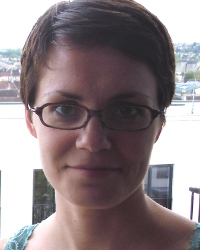We are proud to introduce a new series of interviews in our ChemComm blog. We want you to know more about some of the early career investigators who choose to publish their exciting work with us.
The first in this series is Dr Ruth Webster, from the University of Bath. Read the full interview below.
———-
What inspired you to become a scientist?
As a second year undergraduate, I did a summer placement at GSK in Harlow and absolutely loved being in the lab. Until that point, I really didn’t enjoy the labs as an undergraduate, but this showed me a different side to chemistry. I was working with some people that were brilliant lab chemists and seemed to love what they did. They were also immensely knowledgeable, which made me want to do a PhD.
Then, my fourth year of the five year MSci in Scotland was spent at the Rutherford Appleton Lab near Oxford, helping set-up lasers for visiting academics. Working with so many academics who were so passionate about what they did, working at the boundaries of what we know as scientists, made me realise that a) I was an awful laser chemist (!) and that I should stick to synthetic chemistry and b) I wanted to be an academic.
 How did you find out about ChemComm?
How did you find out about ChemComm?
I remember publishing my first ChemComm article during my PhD. This was the point when my supervisor said (words to the effect of): “That’s it, you’ve made it”, i.e. I had managed to get really good quality work that was going to get noticed and highly cited.
What was the motivation behind the work described in your article? What interested you in this area?
I originally started investigating metal interactions with bulky amides when I got my independent position at Bath, but unfortunately they weren’t behaving how I wanted them to behave, so I decided, having put a lot of effort into the bulky amides, to change tack slightly and look at turning some bulky analogues into polymers.
I’m not a polymer chemist, but did a little bit as a postdoc (also published in ChemComm!) and I enjoyed the challenge of figuring out what I had made. Most of the polymers in this paper are completely novel, so analysing them was not trivial, but when I had figured them out it was awesome! I also had some help from Dr Mark Wyatt at the EPSRC NMSF, whose expertise with MALDI-ToF analysis was invaluable.
I remember publishing my first ChemComm article during my PhD. This was the point when my supervisor said… “That’s it, you’ve made it.“
Dr Ruth Webster, University of Bath
Why did you choose ChemComm to publish your work?
I knew the work was good and novel –I knew it was worthy of being published in ChemComm. I also wanted it to go to a general journal because I feel the transformation itself is interesting to more than just polymer chemists.
Where do you see your research heading next?
We published a really nice piece of iron catalysis in ChemComm about a month after this polymer paper; I love catalysis, so a lot of our research is in this area. We also noticed ligation of the malonamide to copper during the RSC Research Fund work and I was lucky enough to get an RSC Summer Studentship, so we investigated the use of the malonamide as a ligand in copper catalysis. I’m hoping to publish that work soon before expanding our efforts in that area.
If you could not be a scientist, but could be anything else, what would you be?
I got accepted into Art College when I was at secondary school, but went for the Chemistry degree, so I really would have liked to have been a visual artist of some sort. Although I don’t know how much I like the subjectivity of art –at least with science you tend to be either right or wrong!
———-
Did you enjoy Ruth’s story, or do you have your own memorable story about your first ChemComm paper? Tweet us @ChemCommun (#meetCCauthors) or reply in the comments below!
ChemComm fully supports researchers in the early stage of their careers, and remains the leading journal for urgent high-quality communications from across the chemical sciences.










